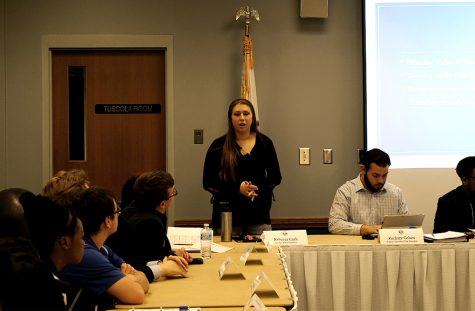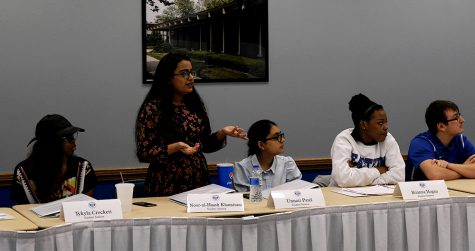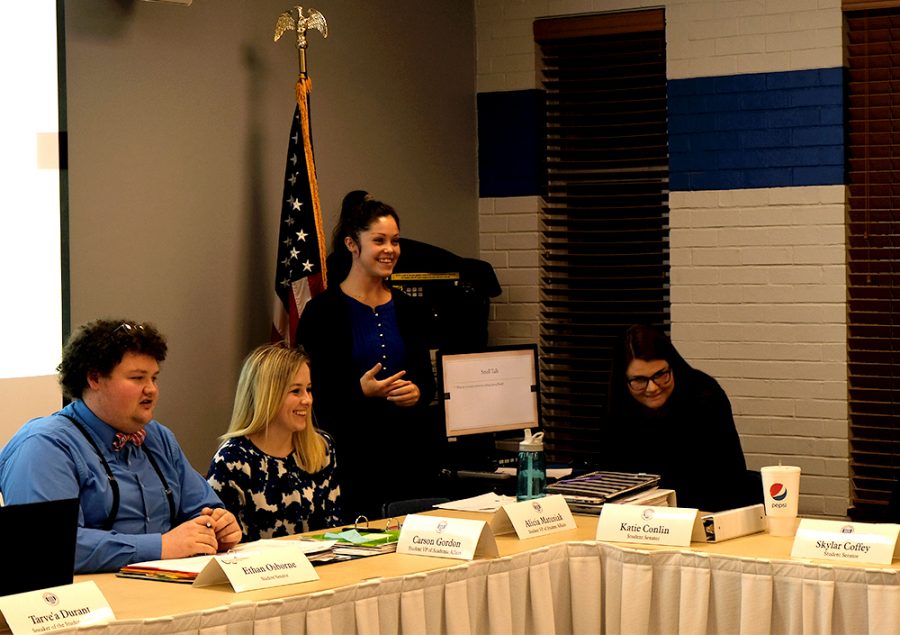Student Senate approves formation of Judicial Research Committee
Jordan Boyer | The Daily Eastern News
Senators laugh with each other while discussing their individual plans for Spring Break Wednesday night at the Student Senate meeting in the Martin Luther King Jr. University Union.
March 7, 2019

Student Body President Rebecca Cash, addresses the senate Wednesday night at the Student Senate meeting in the Martin Luther King Jr. University Union.
Student Senate approved the creation of a Judicial Research Committee to create job descriptions for future student judges during its Wednesday meeting.
The main goal of the Judicial Research Committee, according to Senate Bill 18-19-07, is “to begin the process of bringing back the Judicial Branch of student government.”
In order to create job descriptions for future judges, Carson Gordon, vice president of academic affairs, said the Judicial Research Committee would research other judicial branches from universities similar in size and proximity to Eastern.
Cohen said the committee would likely research Indiana State University, considering how close the student population is to Eastern’s.

Senator Noor-ul-Haash Khamisani, addresses the senate during the Student Senate meeting Wednesday night in the Martin Luther King Jr. University Union.
According to the bill, the Judicial Research Committee will be made up of, but not limited to, one executive member and 3 to 5 students that can be a combination of non-senators and senators.
Cohen said the goal is to get the job descriptions complete by the end of this spring semester so that when students return for the fall semester, the final approval of judges can begin sometime in October.
Cohen said the Judicial Branch used to exist in student government, but it has been absent for several years now, and it has acted as a resource for anyone on the student body.
Gordon said the reason the Judicial Branch has not been a part of Eastern’s student government for so many years is because the branch has so few cases each year.
The branch could see as few as just one case a year, she said, so that combined with the fact that its meetings are not on a weekly basis may have contributed to its falling out.
During the discussion portion of the hearing, Cohen said conflicts with registered student organizations are potential cases judges of the Judicial Branch will have.
“Let’s say the Mindfulness Club decides to change their vice president for no reason and the vice president doesn’t agree with how that happened, then they would be able to come to the Judicial Branch as kind of a third party, not a part of it, get their opinion on it. It’s kind of like a resource for RSOs,” he said.
The cases judges in the Judicial Branch will have, Gordon said, may vary.
“(Cases) can take a few different routes,” she said. “It could be, like Zac (Cohen) said, an issue between an RSO, it could be something where we work on giving a student a voice in student standards; it’s really open right now.”
Even though the Judicial Branch has been absent from student government for some time, Gordon said bringing it back is very important.
“I think it’s really crucial with any government to have three branches with equal representation, and I think this year has really shown us that students need an outlet and they need a voice to raise their concerns,” she said.
Additionally, Student Senate approved 10 RSOs this spring semester, so ensuring these organizations have adequate resources to help any conflicts that may arise is important.
Also at the hearing, Sophie Sarver, a graduate assistant for the Student Life Office, said during her report that more information should be available about the formation of the Diversity Action Council some time after spring break, but before the end of the semester.
Logan Raschke can be reached at 581-2812 or at [email protected].














































